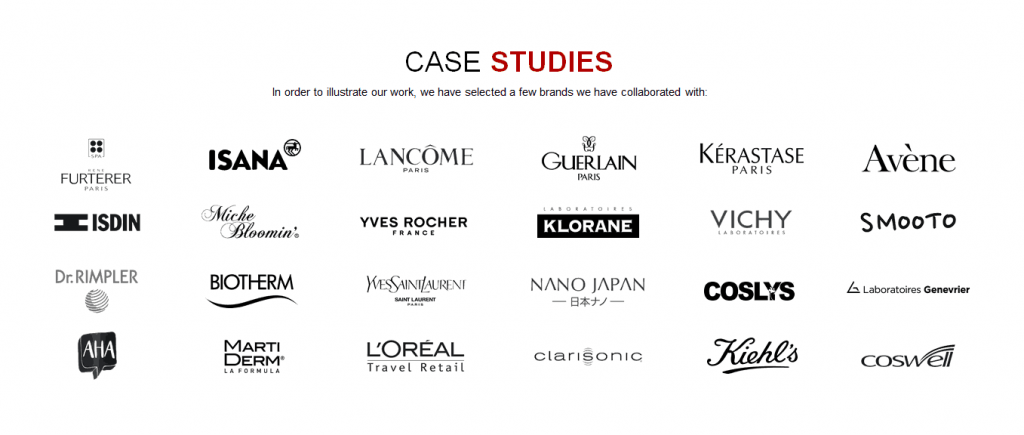With a population of almost 1.4 billion people, China’s rapidly rising wages have contributed to a growth in consumption and an increasing purchasing power. The development of various new technologies-related industries, and China’s digitalization greatly contributed to the success of the most lucrative industry in China: E-commerce.
Whether you have a small business or a large-scale company, you might benefit from this guide our E-commerce Agency has put together. This article will go through the basics of Chinese eCommerce and give you as well some tips and advice on how to successfully enter the Chinese market as a foreign brand.
Contents
- 1 E-commerce in China: a tough competition
- 2 Chinese eCommerce platforms are not for small players
- 3 ROI (Return On Investment)
- 4 Discounts on Chinese eCommerce platforms
- 5 Some tips and advice to succeed on Chinese eCommerce market
- 6 What are the most popular online marketplaces in China?
- 6.1 Tmall: China’s #1 e-commerce platform
- 6.2 Taobao: The mother of all Chinese eCommerce platforms
- 6.3 JD.com: the biggest Tmall competitor
- 6.4 Xiaohongshu: social e-commerce business model
- 6.5 Pinduoduo: low-cost e-commerce in China
- 6.6 China Social eCommerce: Douyin flagship store
- 6.7 More Chinese Cross-border eCommerce platforms
- 7 How to succeed on Chinese eCommerce Platforms as a foreign Brand?
- 8 Need an E-Commerce Agency in China? Contact us to get started
E-commerce in China: a tough competition
In recent years, being present on Chinese eCommerce platforms has become a must for both local and foreign brands that want to succeed in the market. In fact, brands are ready to invest a lot of money in order to be on the most popular Chinese eCommerce platforms such as Tmall or JD.com. The majority of the Chinese population regularly purchases products online, as it is now incredibly easy and convenient do to so notably thanks to great user experience and digital payment platforms.
The graphic below shows the incredible growth of the Chinese e-commerce market: From 108 million online shoppers in 2009 to 842 million online shoppers as of 2021. Now the numbers exceed 900 million. China’s digitalization and the daily use of smartphones connected to the internet have greatly contributed to this growth as consumers spend a lot of time on their smartphones.
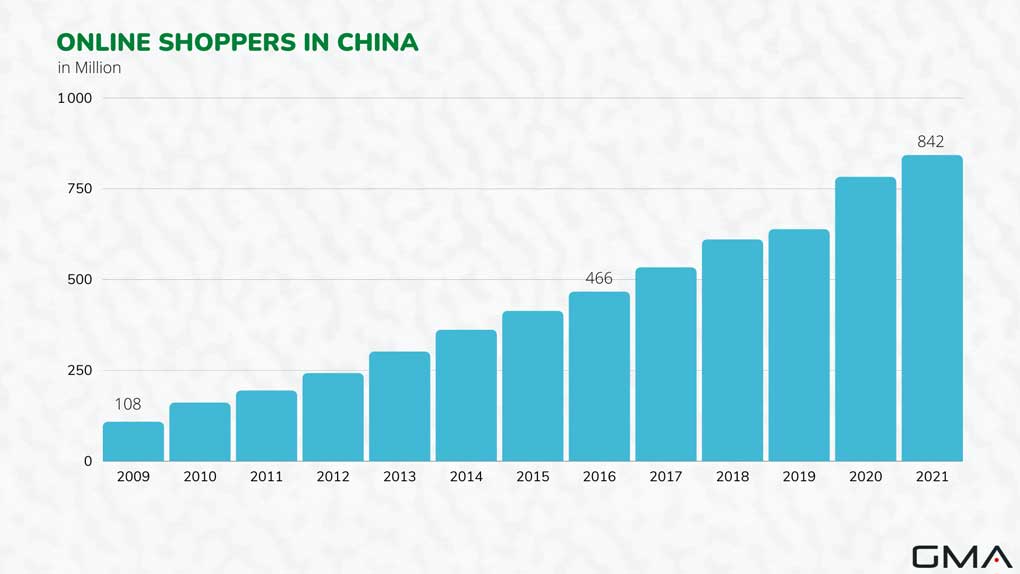
Following the Covid-19 global pandemic, the recorded growth of Chinese eCommerce platforms was even more significant.
It is estimated that by selling on the Chinese eCommerce market, companies can increase their sales by 20%. In China, E-commerce is not only essential for businesses, but also for the country’s economy.
Now, if we look at the projected increase in e-commerce sales worldwide, China is by far the leading country with 862.6 billion dollars as of 2019 and is expected to reach 1,556.2 billion dollars in 2024. It’s expected to represent more than 60% of total retail sales in the country.
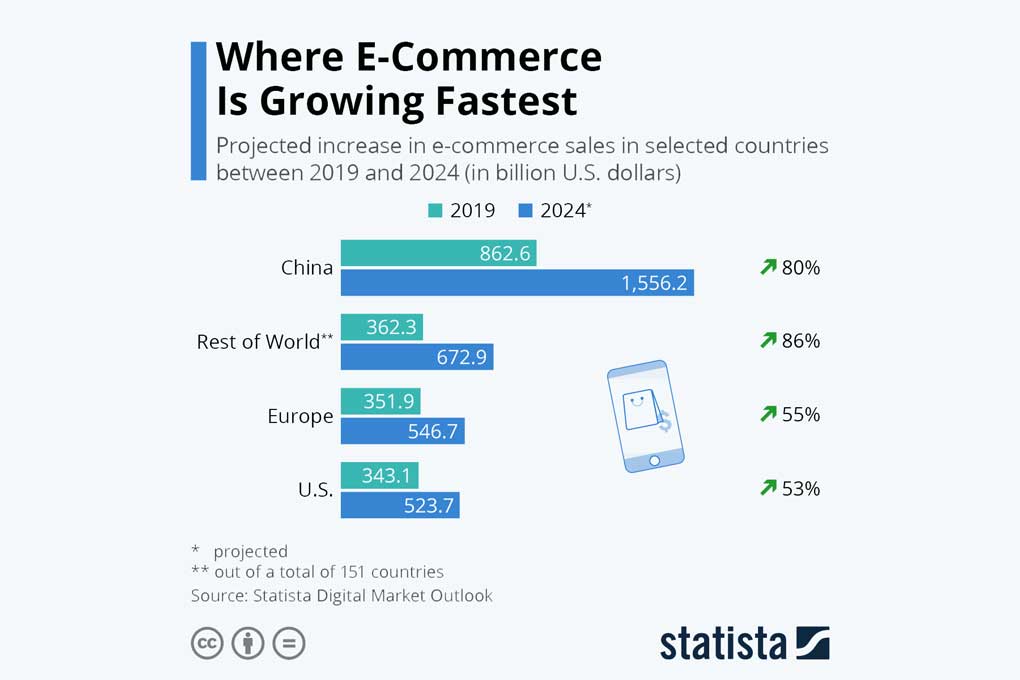
As with anywhere else in the world, selling goods on e-commerce platforms is not always as rewarding as expected. Because the Chinese domestic market is in constant evolution, attracting the world’s biggest companies, there is tough competition comprising both Chinese and international businesses.
Chinese eCommerce platforms are not for small players
If your brand is already well-known in China, it is quite easy to be invited to join Tmall or JD.com. But if you’re just starting, it’s better to start generating online sales elsewhere (for example on WeChat).
But on the other hand, it is much harder for small companies to be accepted on big Chinese eCommerce platforms (and even impossible in some cases). The majority of foreign companies expanding their activities in China have already at least an online presence in China. (This is set to change as more and more platforms are trying to become attractive for all types of brands.)
Why is it hard to make it if my company does not have strong brand awareness in China?
In reality, Chinese consumers are kind of reluctant to buy products from companies that they have never heard of before. So, it is necessary to sell your products through renowned Chinese eCommerce platforms such as Tmall or JD.com, but at the same time, it is almost impossible for small companies to do so because of the strict rules and conditions each platform has set up.
Chinese eCommerce platforms want to be sure that your business will be lucrative and reliable enough, in order for them to get their commission while offering their users an ultimate shopping experience.
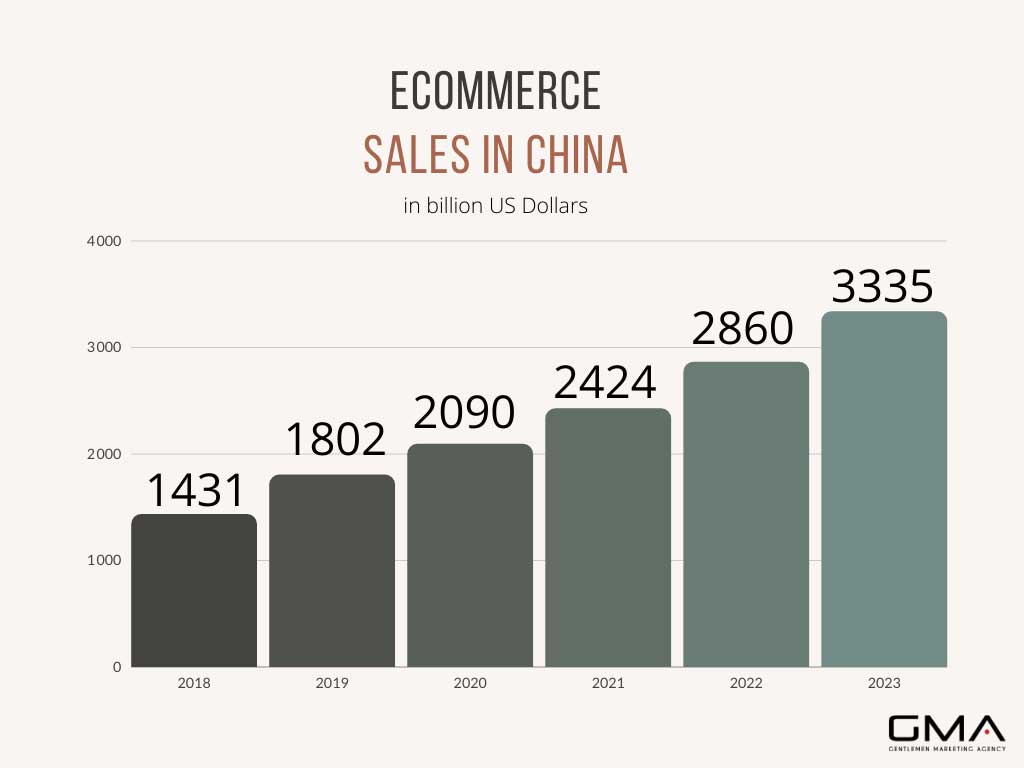
Do I need a physical store in China?
No, and yes. Chinese eCommerce platforms would be reassured that your customer base is able to directly look at your products before buying them on their platforms. Having a physical store on the mainland is also proof (to both consumers and eCommerce platforms) that you are not a scam and of your success. Chinese consumers do like to see a product before buying it online where they can find good deals. The practice has become more mainstream notably with high-end brands. But it’s not necessary to have a physical store to succeed in China.
Can I create my own website to sell my products instead of using Chinese eCommerce platforms?
You can, but note that it’s going to be extremely difficult for you to be profitable. Indeed, as mentioned earlier, Chinese consumers only trust renowned Chinese eCommerce platforms because they know that brands are selected and that merchants are subjected to strict rules when it comes to customer service. In case of any issue, they will be refunded. A company website does not offer this guarantee.
Having a website in Chinese however, is a critical step to your success in China. Having a website means you can be visible on the internet, being visible means you are credible.
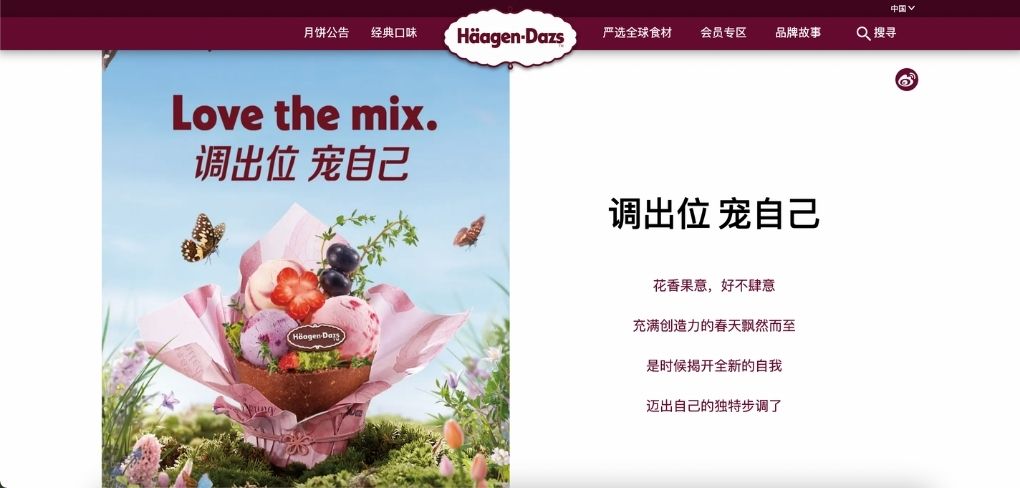
ROI (Return On Investment)
For many people, ROI (Return on Investment) is a taboo topic. You might be wondering how much money brands can make thanks to e-commerce and what percentage of local and international brands succeed on Chinese eCommerce platforms. Well, according to some Tmall employees, it is estimated that 20% of the brands that are on Tmall make profits, 20% do not make profits but are not losing money either, and 60% are losing money.
How is it possible for 60% of brands to lose money on Chinese eCommerce platforms?
- Products are not adapted to the Chinese market
The products are not competitive enough, not unique enough, too expensive, not advertised enough, lack visibility, etc. If you are not familiar with the subtleties of the Chinese market, it can be hard to plan and adapt your marketing and advertising strategies t compete against local brands.
- Fees are too expensive for the company’s budget
In order to sell your products on Tmall or any other big large Chinese eCommerce platform, you will need to pay some fees, pay for your online store, advertise your store, redesign your webpage, etc. Moreover, it is not enough to just spend money on eBranding to gain Chinese consumers’ trust. So in order to be profitable, companies need to work in general with 3 specialists: a designer, a web traffic specialist, and someone who will manage all your marketing strategies.
How to optimize your ROI from eCommerce platforms in China
You should conduct market research beforehand. The data will help to plan the budget and strategy to open your store and succeed on the Chinese eCommerce platform of your choice. Need market research? Feel free to ask us, we have a dedicated team.
Discounts on Chinese eCommerce platforms
Chinese consumers are the best when it comes to bargaining. Even though their purchasing power has increased these last few years, Chinese consumers still want to bargain for everything in order to pay as little as possible (well, who does not…). And this does not only happen in real life but also online!
If you want to attract consumers, you might need to give some vouchers and e-coupons to your WeChat followers for example. These promotions and exclusive offers will push them to buy your products.
Some of the most popular Chinese eCommerce platforms have become specialists in the art of discounts. We can think of Taobao and Pinduoduo for instance (these two platforms also happen to be great for companies with limited budgets). The cheapest your products will be, the more you will be able to sell. Don’t forget that Chinese consumers are ready to compare your products with others, even by asking their friends or on Q&A platforms like Zhihu (知乎).

Some tips and advice to succeed on Chinese eCommerce market
- Be proactive: A brand’s success is tied to how active on e-commerce websites as well as on social media it is. JD and Tmall require businesses to be active, by optimizing and redesigning their online store, managing their ads, optimizing their traffic, etc. It is also important to take part in special events (Single’s day, Golden Week, Valentine’s Day, Christmas, etc) in order to boost your sales and gain visibility.
- Be responsive: the majority of Chinese consumers like to ask questions about your brand or your product, so you need to be ready to reply to them. For example, it is essential to have a WeChat official account, so that they can discuss with you via online chat (make sure to optimize the live chat available on every single Chinese eCommerce platform). You must also encourage them to purchase your products by giving them vouchers or e-coupons.
- Be creative: whether it is for advertising or marketing your products, you will need to be creative in order to stand out amongst your competitors. If you want a cost-effective solution, you can start by creating an H5 brochure on WeChat to present your company. There are many ways to create one, however, you can contact us and we’ll create a personalized and creative H5 brochure for you.
What are the most popular online marketplaces in China?
The Chinese e-commerce landscape is diverse and each of you should be able to find one that fits your needs and business goals. Each and every Chinese eCommerce platform has its pros and cons depending and who you are. Let’s have a look.
Tmall: China’s #1 e-commerce platform
Founded in 2008 under the famous Alibaba group ( Chinese tech Giant founded by Jack Ma), Tmall (天猫), is a subsidiary of the e-commerce website Taobao (淘宝网) and China’s largest eCommerce platform in terms of revenue. Tmall stands out from its competitors thanks to its strict standards in terms of quality. Indeed on Tmall customer experience comes first.
Tmall was able to grab the majority of China’s e-commerce market shares, establishing itself as the most popular Chinese eCommerce platform and becoming the best online gateway for local and international retailers as it added a whole advertising ecosystem at the disposition of its merchants.

Tmall is China’s eCommerce leader with the majority of the market share. It is also the leader in the Chinese Cross border e-commerce market with its Tmall Global Platform (天猫国际).
In short, Tmall is an excellent online channel to reach out to Chinese customers as it enjoys their trust, however, because of entry requirements and high fees it is best suited to high-end and niche international brands.
Taobao: The mother of all Chinese eCommerce platforms
Taobao was one of the first Chinese eCommerce platforms out there and in terms of mobile devices traffic is still one of the leaders. It has almost become a product search engine for Chinese consumers. Unlike Tmall which operates on a B2C model, Taobao operates on C2C, where customers and small entrepreneurs can sell their products directly to consumers in China.
Many innovations come from Taobao before being adopted elsewhere. For instance, Taobao was the first Chinese eCommerce platform to play with the concept of social e-commerce with its integrated social media Weitao in 2014 way before anyone else.
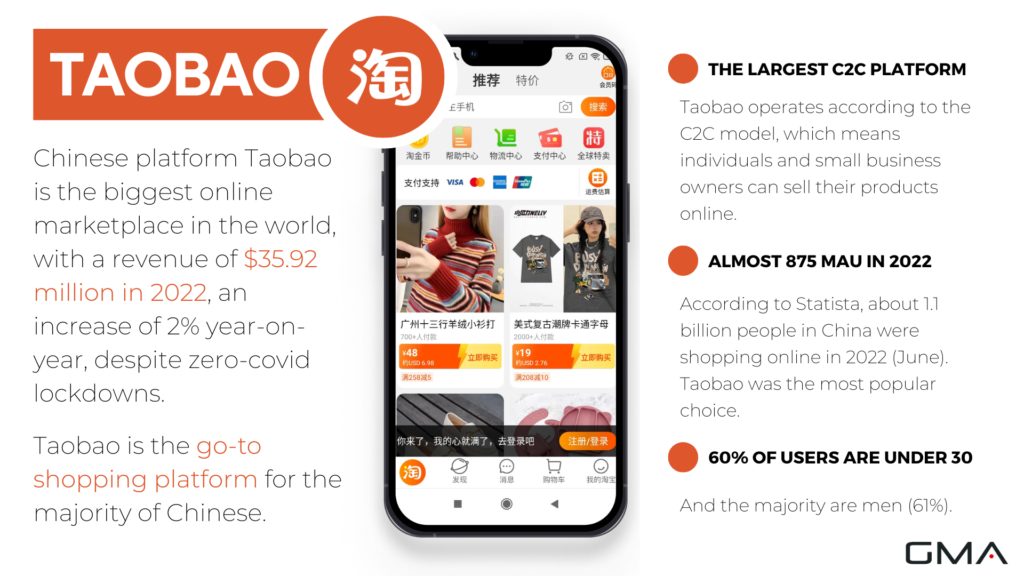
Alibaba-owned Taobao is Tmall’s sister app. It differs from Tmall mainly by its entry requirements but also some of the features on the platform such as Taobao live. Taobao live is integrated live streaming and Kol features that merchants can utilize for promotion.
When scrolling on Taobao, users can be redirected to Tmall, the contrary is not true. For online retailers, that already have a Chinese business license and limited resources, Taobao is a great way to enter the market.
JD.com: the biggest Tmall competitor
Founded in 1998 by Liu Qiangdong in Beijing, JD (which stands for Jingdong 京东) was at the beginning only a magneto-optical store, which diversified over the years with electronics, computers, mobile phones, etc.
In 2004, it opened its online retail platform and quickly became one of the two massive B2C online retailers in China with its competitor the Alibaba-run Tmall. Now, JD.com is partly owned by the giant Tencent, which has 20% of its stake. JD.com has over 500 million active customers and is China’s second-largest e-commerce platform.

JD.com has set its standards for online shopping through its commitment to quality, authenticity, and the variety of products it offers, covering everything from fresh food and apparel to electronic appliances and cosmetics.
JD offers a cross-border option JD Worldwide to foreign businesses that have yet to settle in China but still want to reach out to Chinese customers.
Founded in 2013 by Charlwin Mao and Miranda Qu, Xiaohongshu (小红书) also known as ‘The Little Red Book’ and ‘RED’, is a social media and one of the world’s largest community Chinese eCommerce platforms. Over the years, it has grown from a lifestyle-sharing platform to become China’s foremost shopping platform for beauty, fashion, and luxury products.
As of 2023, Xiaohongshu is boasting over 300 million registered users and 85 million monthly active users.
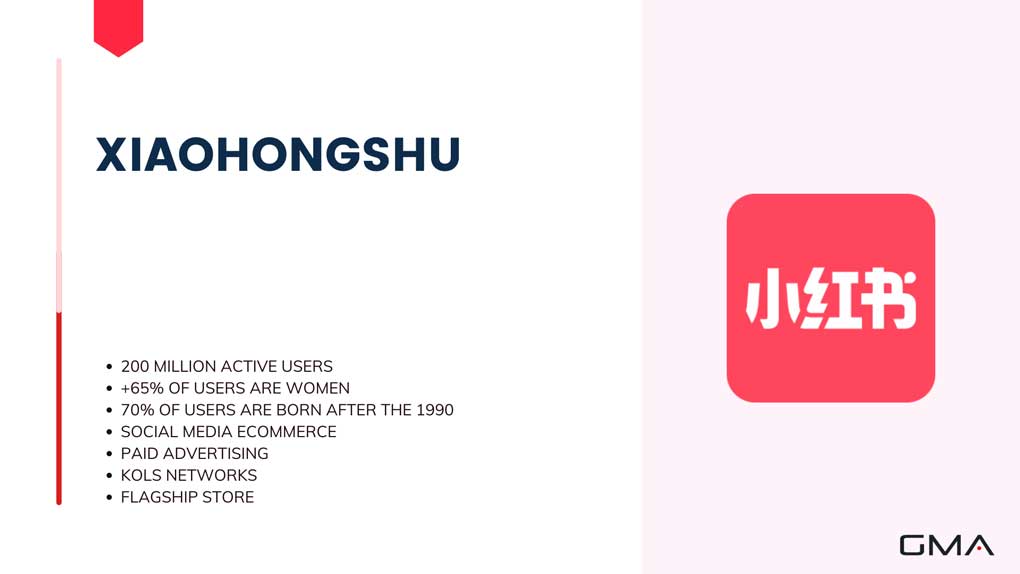
In its beginning, Xiaohongshu was a social media platform focused on user-generated content on which users were able to review products and share their shopping experiences. However, in order to expand its activities and monetize, it has become a sort of combination of Pinterest and Instagram, with e-commerce features. RED also created its own cross-border eCommerce platform: ‘Fulishe’ (福利社).
On Xiaohongshu, people are able to post and share product reviews, travel blogs, and lifestyle stories via pictures and short videos. Xiaohongshu is also running RED Mall, a platform on which Chinese consumers are able to purchase international products.
Although RED is not a major eCommerce player, it has its benefits as a secondary selling channel for brands in the lifestyle and beauty industry. Its integrated eCommerce program, offers, a smooth customer experience when purchasing an item.
Pinduoduo: low-cost e-commerce in China
Pinduoduo, despite its huge monthly traffic, is one of the latest players that has made its way into the Chinese eCommerce world and is experiencing rapid growth. Founded in 2015, Pinduoduo quickly became the fastest-growing tech company in the world.
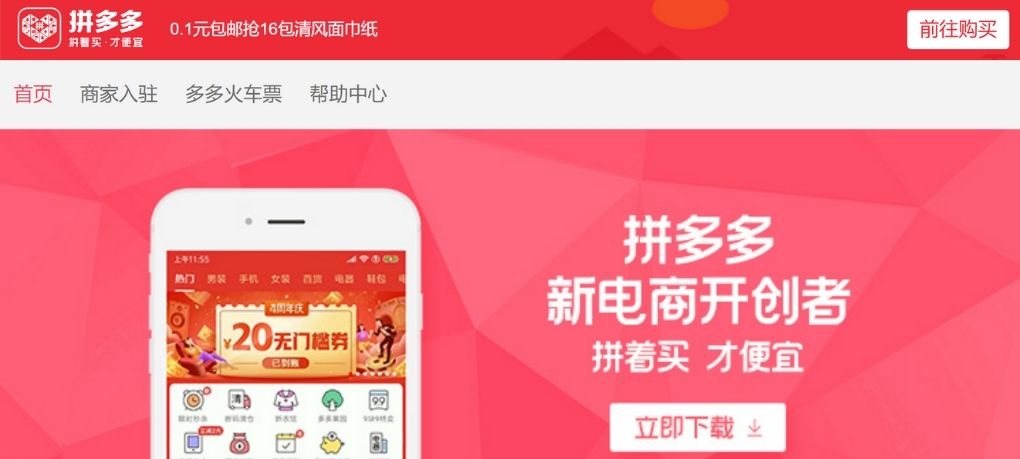
If you want to export your fresh products in China, you should definitely choose Pinduoduo, as it is the largest agriculture-focused e-commerce platform in China and its business model differs from the competition. It directly connects farmers and distributors with consumers. Pinduoduo has revolutionized e-commerce, becoming a social commerce platform as well as a consumer-to-manufacturer (C2M).

On Pinduoduo, consumers can discover and purchase products from a wide range of sellers. What sets Pinduoduo apart is its social aspect, because users can easily share what they have browsed or purchased with their social network.
They can also invite them to join teams within 24 hours, in order to benefit from lower prices. Thanks to Pinduoduo, consumers can enjoy a group tariff while receiving the product individually directly at home.
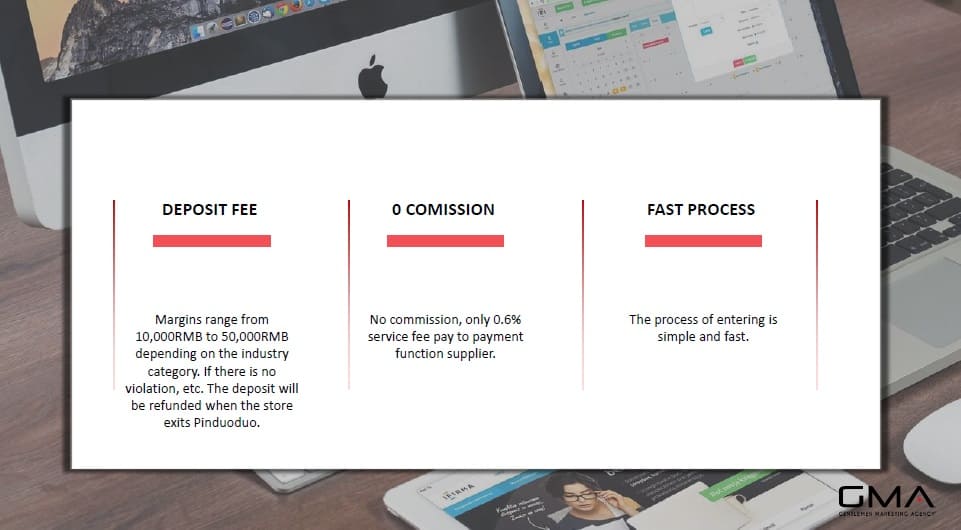
It is also important to know that Pinduoduo is very low cost for both consumers and merchants, thanks to its policy of “no commission”. In fact, you will just have to pay a 0.6% service fee to the payment function supplier. Now you might wonder how does Pinduoduo makes profits?
Pinduoduo mainly monetizes through advertising, with 90% of its revenues coming from online marketing services such as affiliation programs, flash sales, and so on. This explains why Pinduoduo really revolutionized Chinese eCommerce platforms, with an innovative marketing strategy, and its low-cost system and fast process.

Moreover, another asset of Pinduoduo is that you can directly advertise and promote your products on the app. For example, you can use live streaming to explain the benefits of your products. You can also hire KOLs to attract a wide audience.
China Social eCommerce: Douyin flagship store
With more than 730 million daily active users in China as of 2023, Douyin, known as Tik Tok in other parts of the world, is one of the most lucrative and promising apps in China. In March 2021, Douyin launched its flagship stores, available for brand accounts on its platform, marking a major step into e-commerce.
Until now, Douyin was just a way to promote new products and popular items to consumers through short videos and live-streaming. Moreover, it was also possible for companies to send vouchers to their followers and add links to e-commerce platforms such as JD.com and Taobao. However, the novelty of these flagship stores is all about marketing.
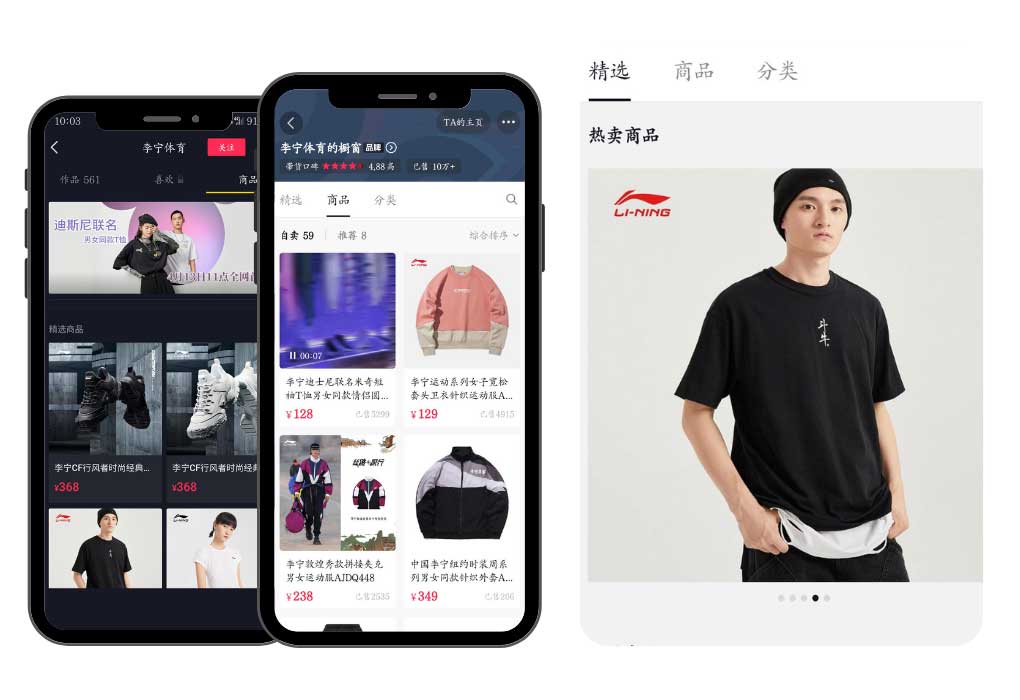
Brands are now able to create their own flagship store directly on Douyin, which allows them to increase their conversion rate. This feature also includes the possibility to create campaign banners, send vouchers and recommendations, and offline store information. Consumers are then able to claim these vouchers, which can be used both online and offline.
More Chinese Cross-border eCommerce platforms
- Suning: Offers both local and cross-border platforms. Ideal for home appliances and electronics brands.
- Kaola: Kaola is China’s largest cross-border eCommerce platform with most of the market share. The Alibaba Group bought the platform.
- VIP: China’s biggest flash sales app. Focuses on beauty and lifestyle product categories.
How to succeed on Chinese eCommerce Platforms as a foreign Brand?
The important thing to understand is that just being present on Chinese e-commerce platforms is not enough to generate sales in China. The competition is big and you need to stand out from the crowd for Chinese shoppers to notice you. To do so, you need to take care of your marketing strategy, so that people start to recognize your brand.
Websites, Baidu SEO & SEM for traffic & credibility
To succeed in China, you will need to increase your visibility. How? You can start by focusing on the most popular search engine in China: Baidu (百度). As a matter of fact, more than 70% of online research is conducted through Baidu.
After creating your Chinese website (in Mandarin), you will have to focus on Baidu to increase your visibility and e-reputation. Baidu SEO is one of the most cost-efficient ways of not only gaining traffic but also controlling your online brand reputation. In short, it’s one of the best investments for the traffic you can make that will subsite in the long term.

To develop your visibility on Baidu, you can use different marketing solutions such as:
- Pay Per Click advertising (PPC)
- Search Engine Marketing (SEM)
- Search Engine Optimization (SEO): you will need to create qualitative content, and shareable information, use keywords to increase your online presence on Baidu, etc.
With the country’s digitalization, the way of advertising and promoting products has shifted to social media. Chinese users are very active on social media platforms and are used to commenting, sharing their purchasing experience as well as giving purchasing advice.
WeChat 微信: #1 social networks
With more than 1.26 billion monthly active users, WeChat is the most popular app in China. Even though it was at first a messaging app, the app released under the giant Tencent in 2011 quickly became a vast ecosystem of services. Nowadays, WeChat is a must-have for every citizen and business as it became a new player in the e-commerce industry.

One key point for successfully promoting your brand through WeChat is to create a WeChat Official Account. Don’t worry, if your brand is still not present in China, we will help you find and reach your target audience by improving your brand awareness as well as creating your WeChat official account.
Then, to successfully promote your brand, we can launch campaigns to create buzz, as well as create an H5 brochure in order to promote your brand. There is also a possibility of launching a WeChat store, one of the most efficient marketplaces in the Chinese e-commerce market in 2023.
Weibo 微博: The place to be commercial
Weibo is one of the most popular social media apps in China with more than 600 million monthly active users. 94% of its user base uses the mobile app. Weibo is an open social media, and just like Twitter, is one of the most efficient platforms to create buzz and gain visibility.
Contrary to Wechat, which is private, Weibo is open to advertising and its users are as well. That is the place to advertise and engage in a commercial way with your followers.

The social media platform attracted more than 150 000 companies wanting to develop their e-reputation. Brands have to create Weibo Official Accounts to improve their presence in China by attracting followers.
It is estimated that more than 62% of Weibo users follow at least one brand on Weibo.
Our favorite Weibo marketing tools are:
- Weibo Paid Ads
- Weibo Influencers
- Weibo Lucky draw & lottery
- Weibo #hashtag
When compared to other social media platforms in China, Weibo’s relatively cheap advertising options, as well as its open nature, make it an interesting platform for foreign players. The app audience is also varied and reaches users in many (most) Chinese cities.
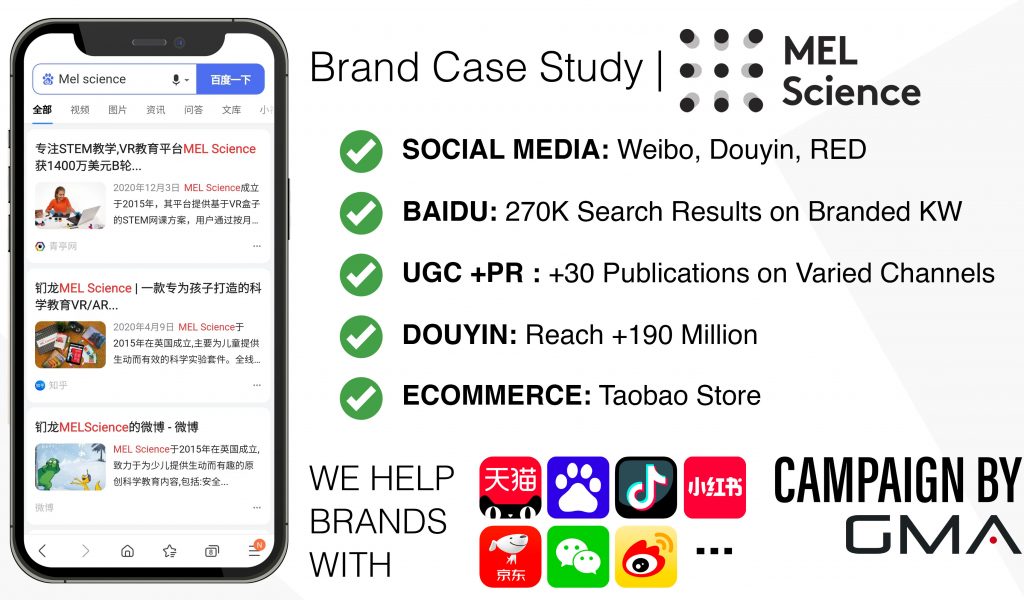
KOLs in order to promote your brand
In China, one of the best ways to promote your brand and your product is to collaborate with KOLs (Key Opinion Leaders). They act like influencers who are able to sell hundreds (or millions) of products in a short amount of time. If you want to hire a KOL, do not hesitate to contact us as we have a list of KOLs.

Focus on your branding
Branding is one of the most important aspects in order to conquer the Chinese market, even for pure e-commerce players. Most Chinese consumers want to buy a product because of its brand. Thus, they want to buy premium and reputable brands.

E-reputation to increase your sales on Chinese eCommerce platforms
In China, brand reputation is the key to success. You have to do everything you can to always have a good image. If you lose your reputation, you will lose everything.
You need to make sure that you get good comments for your brand on forums, social media, and other websites. Chinese consumers only trust brands that have good comments and recommendations from friends or family and on media platforms.
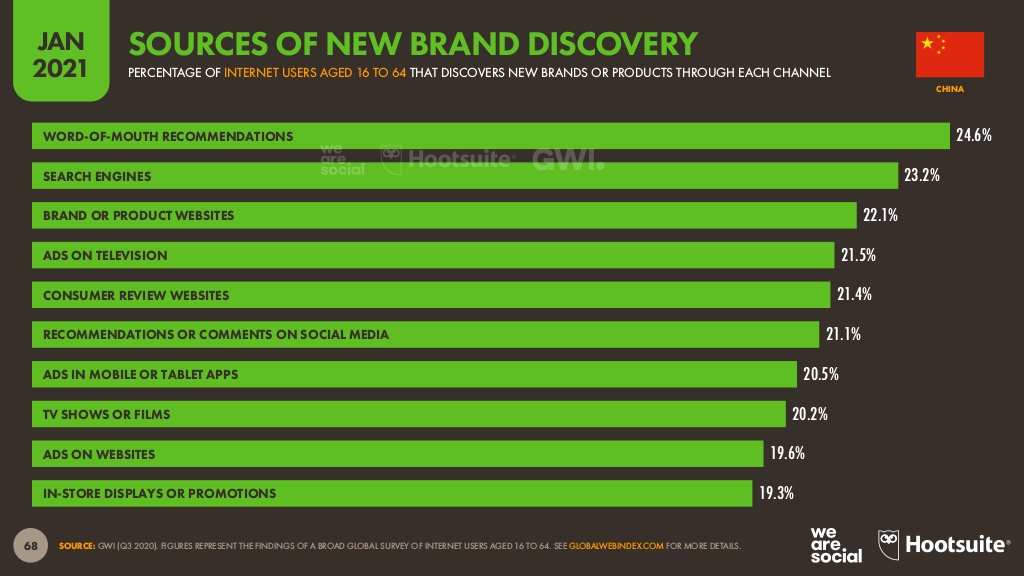
If we look at the main sources of new brand discovery, word-of-mouth is the most effective way to get new clients. It is even more powerful than search engines and brand websites.
Encourage conversation about your brand to develop traffic, good comments, and recommendations.
If you want to successfully manage your brand image in China, you can contact us and we’ll take care of everything.
Need an E-Commerce Agency in China? Contact us to get started
It is clear that China has become the market to conquer for brands that want to expand their activities worldwide. However, the Chinese market is completely different from what you might be accustomed to. In order to successfully enter this competitive market, you will need experts who fully understand the subtleties of China.

GMA is a digital marketing and eCommerce agency based in Shanghai, with experts all around the world. Depending on your needs and the scope of work, we will adapt our marketing strategy in order for you to get the most out of e-commerce in China. Feel free to ask for a free consultancy session, we will be happy to discuss your china project no matter the size of your company!
- Digital Marketing
- SEO and SEM
- Online Reputation
- Social Media Marketing
- Kols & Live streaming
- Lead Generation
- E-Commerce
Tmall Certified Partner
We are certified Tmall Partners. Collaborate with us for a smooth journey on Tmall.

Get in Touch with us to get started. We offer a free consultation with one of our experts, where we will learn about your brand and present the best e-commerce solutions for your China strategy. Let’s keep in touch!
